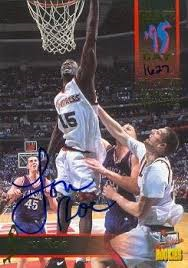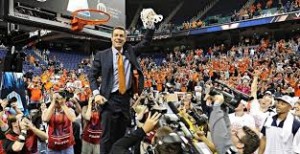For all the rest of our extensive Preseason Coverage – CLICK HERE
The good news is that UMass head coach Derek Kellogg has a remarkable rebounder on his bench; the bad news is that he will be wearing a suit all season. Lou Roe is the Assistant Director of Basketball Operations for his alma mater, where his name is still prominent in the Minutemen’s record book. His 1905 career PTS remains #4 all-time, his 1070 REB is still the best in school history, and in 1995 he was named A-10 POY. After playing pro basketball for 17 years, he is back on campus to help his team try to make the NCAA tourney for only the 2nd time this millennium. HoopsHD’s Jon Teitel got to chat with Lou about playing for John Calipari and working for his former teammate.
You played for Coach John Calipari at UMass: what makes him such a great coach, and what is the most important thing that you ever learned from him? It is hard to deal with 18-23 year olds who have different personalities, but he learns what makes them tick and knows how to bring the best out of them. He is a very personable guy and makes everyone feel like they are part of the process. The best thing I learned from him is that nothing bad comes from giving 100%. I was successful as a college player because he unlocked my talent and brought it to the surface.
Take me through the 1992 NCAA tourney (the 1st for UMass in 3 decades):
Center Harper Williams had 18 PTS/15 REB and made a 3-PT shot with 30 seconds left (only his 2nd of the season) in a 6-PT OT win over Syracuse: did you think the shot was going in, and what was the feeling like in your locker room afterward? I was a freshman back then so I did not really understand what that shot meant at the time, but I soon learned that it was a great era for UMass basketball. People yearned for the program to do better and that win really put us in the national spotlight.
You scored 9 PTS in a 10-PT loss to Kentuky despite a 70-foot shot by Jim McCoy at the end of the 1st half (Jamal Mashburn scored 30 PTS): where does that shot rank among the amazing you have ever seen? That has to be up there. I was actually on the floor when he did it: it was a pretty long shot! We practiced half-court shots after our normal shoot-around and McCoy just felt comfortable in that situation.
In November of 1993 you scored a game-high 28 PTS in your school’s 1st-ever game against a #1-ranked team (a 5-PT OT win over North Carolina at Madison Square Garden): what was it like to play at the Garden, and what was the reaction like when you got back to campus? I grew up watching Dean Smith because Michael Jordan/James Worthy played there and my stepfather was a huge fan of the Tar Heels. I was a little bit in awe during the pre-game banquet but then I realized I had to re-focus and just go out and play. Nobody expected us to win: I remember getting off the bus and hearing a fan say that we looked like we were going to lose. We started out down 10 PTS early and Calipari called a timeout: he said that we had to give it all we could or else we would lose on national TV by 100 PTS! I remember seeing Spike Lee and some other celebrities. We went out and won the game and when we got back to campus we were embraced by the whole community. They had been waiting for that kind of success for a long time.
Take me through the 1994 Goodwill Games in Russia as a member of team USA:
Which of your teammates impressed you the most (Michael Finley/Tim Duncan/Damon Stoudamire/other)? I would have to say Stoudamire. He was my roommate on the road and a very smart PG who understood the game. He was an incredible scorer and a better teammate.
After a follow-dunk by Finley caused a 45-minutes delay to install a new rim, your team was able to stay focused and win the rematch against Russia to take home the bronze medal: was your team out for revenge after a 2-PT loss to the host team in the opening round? Absolutely. We were kids and the Russians were grown men so we did not understand the gravity of what we were up against. We were up for any challenge and we understood that we could win the rematch. We were so fearless that we really thought we would bring home the gold.
In November of 1994 you had a career-high 34 PTS (12-20 FG/10-11 FT) and 13 REB in a win over defending national champion Arkansas: was it just 1 of those scenarios where every shot you put up seemed to go in because you were “in the zone”? It was a very exciting game for so many reasons, 1 of which was that they were the defending champs. I heard that Corliss Williamson told his local press that their 2nd team could beat our starting team, which really pissed me off. I made copies of that quote and put it in everyone’s locker. I had a brief conversation with Dick Vitale the night before our game and he said that he thought Corliss was a better player. He also said that if we won then he would say that I was the best player in the country! I had many motivations that night but our top priority was to win the game.
In March 1995 you were named conference POY/tourney MVP and became the 1st consensus All-American in school history: what did it mean to you to win such outstanding honors? It just showed that people had an appreciation for all the work I had put in to transforming my game and building my body. I can look back and say that I took full advantage of every moment that I had on the floor.
In the 1995 NCAA tourney you scored 8 PTS in a win over Tulsa at the Meadowlands: how exciting was it to play in your home state of New Jersey? It is tough for a young guy at the end of the season after getting used to the routine of conference play. The NCAA tourney has a spectacular atmosphere so it was fun to play in front of my home crowd.
In the summer of 1995 you were drafted in the 2nd round by Detroit (9 spots behind your Goodwill Games teammate Finley): were you thrilled to realize your dream of making it to the NBA, or disappointed that you did not get selected in the 1st round, or other? I have to say that I was a bit disappointed. There were a few teams who thought that I would not be around at the end of the 1st round, so after I did not get picked in the top-15 I started to get a little worried. After Joe Dumars/Grant Hill called me on draft day it helped give me some more confidence: I know that my mother was elated.
You played a total of 66 games during your 2-year NBA career and later played professionally for over a decade in a number of foreign countries: what did you learn from your experience abroad, and how did it compare to the NBA? I played in a bunch of countries that each have their own rich traditions. America is like go-go-go while people in Spain taught me to just take my time and enjoy what life is all about.
You are currently back at your alma mater assisting head coach Derek Kellogg: how do you like working for your former teammate, and what do you hope to do in the future? I love working with Derek because I have always wanted to teach. My final year in Argentina I would teach my 21-year old teammates as a 37-year old player. I like giving kids the tools to help them throughout their lives, and basketball gives me the opportunity to give back to a sport that gave me so many things.





